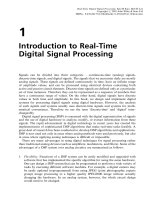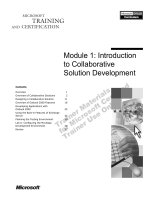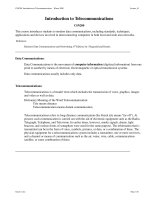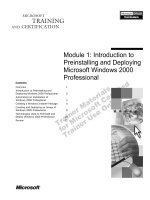Tutorial 1: Introduction to research in applied linguistics
Bạn đang xem bản rút gọn của tài liệu. Xem và tải ngay bản đầy đủ của tài liệu tại đây (446.13 KB, 55 trang )
Tutorial 1: Introduction to
research in applied linguistics
• Instructor: Assoc. Prof. Dr. Le Hung Tien
• Group 1:
Nguyen Duong Ha
Nguyen Thi Bich Ngoc
Do Thi Phuong Thanh
Tran Thi Thu Trang
I. What is research?
SEVERAL DEFINITIONS:
1. Research is a systematic process of inquiry
consisting of 3 elements or components:
- A question, a problem, or a hypothesis
- Data
- Analysis and interpretation of the data.
(Nunan 1992)
I. What is research?
2. Research is the process of going up alleys to
see if they are blind.
(Marston Bates, American writer)
3. Research is what I am doing when I don't know
what I am doing.
(Von Braun, American engineer)
4. If you steal from one author, it's plagiarism; if
you steal from many, it's research.
(Wilson Mizner, American dramatist)
I. What is research?
5. Research is:
- about inquiry. It has 2 components: process and
product. The process is about an area of inquiry
and how it is pursued. The product is the
knowledge generated from the process as well
as the initial area to be presented.
- a process which involves (a) defining a problem,
(b) stating an objective, and (c) formulating an
hypothesis. It involves gathering information,
classification, analysis, and interpretation to see
to what extent the initial objective has been
achieved.
- undertaking structured investigation which hopefully
results in greater understanding of the chosen
interest area. Ultimately, this investigation becomes
accessible to the "public".
- an activity which analyses and critically evaluates
some problems.
- to collect and analyze the data in a specific field with
the purpose of proving your theory.
- evaluation, asking questions, investigations, analysis,
confirming hypotheses, overview, gathering and
analyzing data in a specific field according to certain
predetermined methods.
(Nunan 1992)
• 6. In the first sense, the outcome of
research is the establishment, publicizing,
or utilization of something that somebody not the researcher or the person
commissioning it - already knows. In the
second sense, the outcome is the
knowledge nobody had before.
II. Purposes of a research
- getting a result with scientific methods objectively, not
subjectively.
- solving problems, verifying the application of theories, and
leading on to new insights.
- enlightening both researcher and any interested readers.
- proving/ disproving new or existing ideas, to characterize
phenomena (i.e., the language characteristics of a particular
population), and to achieve personal and community aims.
That is, to satisfy the individual's quest but also to improve
community welfare.
- proving or disproving, demystifying, carrying out what is
planned, to support the point of view, to uncover what is not
known, satisfying inquiry. Discovering the cause of a problem,
finding the solution to a problem...
(Nunan 1992)
Sample research
– Title: Jordanian Undergraduate EFL Students'
Errors in the Use of the Indefinite Article
– Author : Dr. Rula Fahmi Bataineh, Jordan
University of Science and Technology, Irbid,
Jordan
– Source: 2005 Journal, Volume 7, Issue 1,
March 2005,
/>b.php
The objectives of this research
• (1) to investigate and then identify the errors the
learners make in terms of their types and
potential sources
• (2) to compute and compare the relative
frequency of these errors to detect any
developmental tendencies among the learners of
the different levels of proficiency
• (3) to determine any potential differences among
the subjects which can be attributed to class
level or average length of compositions
How these objectives are achieved:
• Stating the research questions
• Choosing a suitable study design
• Selecting the research instruments
• Choosing sample size
• Collecting data and Analyzing them
• Presenting and Discussing the
findings
III. Different views of the
nature of social sciences &
social reality
Social Sciences
Traditionalview:
view:
Traditional
Social
sciences
arethe
the
Social
sciences
are
Traditional
view:
Social
Traditional view: Social
same
asthe
thesame
natural
sciences
are
the
same
asthe
the
same are
as
the
natural
sciences
as
natural
sciences,
should
sciences,
should
natural
sciences,
should
sciences,
should
discovernatural
naturaland
and
discover
discover
natural
and
discover
natural
and
universal
laws
regulating
and
universal
laws
regulating
and
universal
laws and
universal
laws
determining
individual
determining
individual
and
regulating
and
socialbehaviors.
behaviors.
regulating
and
social
determiningindividual
individual
determining
andsocial
socialbehaviors.
behaviors.
and
Interpretiveview:
view:
Interpretive
Interpretive
view:the
While
While
sharing
rigor
Interpretive
view:
While
While
sharing
the
rigor
sharingthe
therigor
rigorofofthe
the
sharing
of
the
natural
sciences
ofnatural
the natural
sciencessciences
andthe
the
natural sciences
and
andthe
the
concernand
to
concern
describe
and
concern
to
concern
totodescribe
and
explain
human
behaviors,
describe
and
explain
explain
human
behaviors,
describe
and
explain
emphasizes
the
differenceofof
emphasizes
difference
humanthe
behaviors,
human
behaviors,
peoplefrom
frominanimate
inanimatenatural
natural
people
emphasizes
the
emphasizes
the
phenomena
andfrom
from
each
phenomena
and
each
difference
ofpeople
people
other.
difference
of
other.
frominanimate
inanimatenatural
natural
from
phenomenaand
andfrom
from
phenomena
eachother.
other.
each
Social reality-the truth
• A social reality is any causally efficacious
system, structure, or mechanism which
can exist independently of any particular
historical individual, but cannot exist
independently of some group of individuals
somehow linked together in sustaining or
reproducing that reality from day to day
(Bhaskar 1979; Durkheim 1982; Giddens
1979).
Social reality-the truth
=> is distinct from biological reality or individual
cognitive reality, and consists of the accepted
social tenets of a community.
(Hitchcock and Hughes)
Examples:
• French is an existing social reality
• Cornish (a dead language) - is not a social
reality
Social reality assumptions
1
Ontological assumptions
2
Epistemological
assumptions
Different social reality assumptions
• Ontological assumptions
– "Do social structures determine an individual's
behavior or does human agency?"
•
Social reality external to individuals (objective
nature): Fixed, stable, observable, measurable
•
Social reality - the product of individual
consciousness (results of personal recognition):
Multiple realities that are socially constructed by
individuals
Different social reality assumptions
Epistemological assumptions
•
Knowledge is hard, objective and tangible:
researcher is observer – natural methods,
positivism: Gained through scientific and
experimental research. Knowledge is objective
and quantifiable
•
Knowledge is personal, subjective and unique:
researcher- participant observer, rejection of
natural science methods, anti-positivism: Gained
through understanding the meaning of the
process/experience.
Different social reality
assumptions:
• Ontological assumptions give rise to
epistemological assumptions, and
these in turn give rise to
methodological considerations which
give rise to issues of instrumentation
and data collection
Social reality assumptions & their
orientations to research
Ontology
(nature of reality)
1
11
22
Epistemology
(knowledge)
Orientations to
Research
Fixed, stable,
observable,
measurable
Gained through scientific Post-positivist
and experimental research. Research
Knowledge is objective
(Quantitative)
and quantifiable
Multiple realities
that are socially
constructed by
individuals.
Gained through
understanding the
meaning of the
process/experience.
Interpretive Research
(Qualitative,
phenomenology,
ethnography, case
study, grounded theory)
IV. Research process
What is research process?
A process of formulating
questions, problems, hypothesis
Collecting data or evidence relevant to
these questions, problems or hypothesis
Analyzing
Analyzingor
orinterpreting
interpretingdata
data
(Nunan,
(Nunan,1992)
1992)
A model of research process
1
2
problem / experience / observation
hypothesis/ research questions
3
4
data gathering/ collection
5
6
investigation and experimentation
to test the hypothesis/ research questions
data analysis and interpretation
confirmation or disapproval of the hypothesis
(Wisker, 2001)
The first phase: Problem
Recognition & Hypothesis
• Experience
• Observation
• Questions for brainstorming
• Focused research questions/ Hypothesis
IIlustrations from real research
reports
– Title: Jordanian Undergraduate EFL Students'
Errors in the Use of the Indefinite Article
– Author : Dr. Rula Fahmi Bataineh, Jordan
University of Science and Technology, Irbid,
Jordan
– Source: 2005 Journal, Volume 7, Issue 1,
March 2005, />
The problem arises from some
starting points:
- The experience:
‘The English articles a(n), zero, and the are quite difficult to
acquire not only for ESL/EFL learners but also for
children learning English as a first language. (CelceMurcia and Larsen-Freeman, 1999).’
- An observation of the author:
‘The English article system is one of the most difficult
structural elements for ESL/EFL learners, especially for
those whose native languages do not employ articles or
article-like morphemes.’









